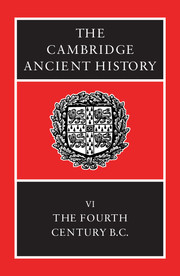Book contents
- Frontmatter
- 1 Sources and their uses
- 2 Sparta as victor
- 3 Persia
- 4 The Corinthian War
- 5 Sicily, 413–368 B.C.
- 6 The King's Peace and the Second Athenian Confederacy
- 7 Thebes in the 360s B.C.
- 8 Regional surveys I: Persian lands and neighbours
- 9 Regional surveys II: the West and North
- 10 Society and economy
- 11 The polis and the alternatives
- 12 Greek culture and science
- 13 Dion and Timoleon
- 14 Macedon and north-west Greece
- 15 Macedonian hegemony created
- 16 Alexander the Great Part 1: The events of the reign
- 17 Alexander the Great Part 2: Greece and the conquered territories
- 18 Epilogue
- Chronological Table
- BIBLIOGRAPHY
- Index
- Map 1: Greece and Western Asia Minor
- Map 9: Egypt
- Map 20: Alexanders campaigns
- References
6 - The King's Peace and the Second Athenian Confederacy
Published online by Cambridge University Press: 28 March 2008
- Frontmatter
- 1 Sources and their uses
- 2 Sparta as victor
- 3 Persia
- 4 The Corinthian War
- 5 Sicily, 413–368 B.C.
- 6 The King's Peace and the Second Athenian Confederacy
- 7 Thebes in the 360s B.C.
- 8 Regional surveys I: Persian lands and neighbours
- 9 Regional surveys II: the West and North
- 10 Society and economy
- 11 The polis and the alternatives
- 12 Greek culture and science
- 13 Dion and Timoleon
- 14 Macedon and north-west Greece
- 15 Macedonian hegemony created
- 16 Alexander the Great Part 1: The events of the reign
- 17 Alexander the Great Part 2: Greece and the conquered territories
- 18 Epilogue
- Chronological Table
- BIBLIOGRAPHY
- Index
- Map 1: Greece and Western Asia Minor
- Map 9: Egypt
- Map 20: Alexanders campaigns
- References
Summary
THE SUPREMACY OF SPARTA
The Peace of Antalcidas had humbled Sparta's enemies and left them impotent, at least for the time being. The breaking of the Theban hold over Boeotia was followed by the refoundation of Plataea (Paus. IX. I. 4), which probably took place at this time rather than after the seizure of the Cadmea, the citadel of Thebes, and it is likely that Thebes was forced into alliance with Sparta (Isoc. XIV.27, Plut. Pel. 4.5). This has been doubted, but the absence of any allusion to the alliance at the time of the Theban negotiations with Olynthus and the trial of Ismenias is not sufficient to prove that it did not exist.
The Corinthian War was over. Now, as she had in 421 and 404, Sparta turned her attention to the conduct of her friends in the war. Her aim (Xen. Hell. v.2.1) was to punish those of her allies who had favoured the enemy and make such disloyalty impossible for the future. The first victims of her displeasure were the perennially restive Mantineans, who had shown their unreliability in various ways. They had evaded military service under pretext of a sacred truce, shown little enthusiasm when they had served, rejoiced at Sparta's military failures and even supplied the Argives with corn. Therefore, in 385, Sparta issued an ultimatum. Mantinea must dismantle her fortifications: compliance would be accepted as retrospective proof of loyalty. The Mantineans refused, and so an expedition was mounted. Agesilaus was reluctant to command, allegedly because of Mantinea's services to his father, so Agesipolis led the Spartan army, even though his father Pausanias had been on good terms with the leaders of the Mantinean people (Xen. Hell. V.2.3).
- Type
- Chapter
- Information
- The Cambridge Ancient History , pp. 156 - 186Publisher: Cambridge University PressPrint publication year: 1994
References
- 16
- Cited by



